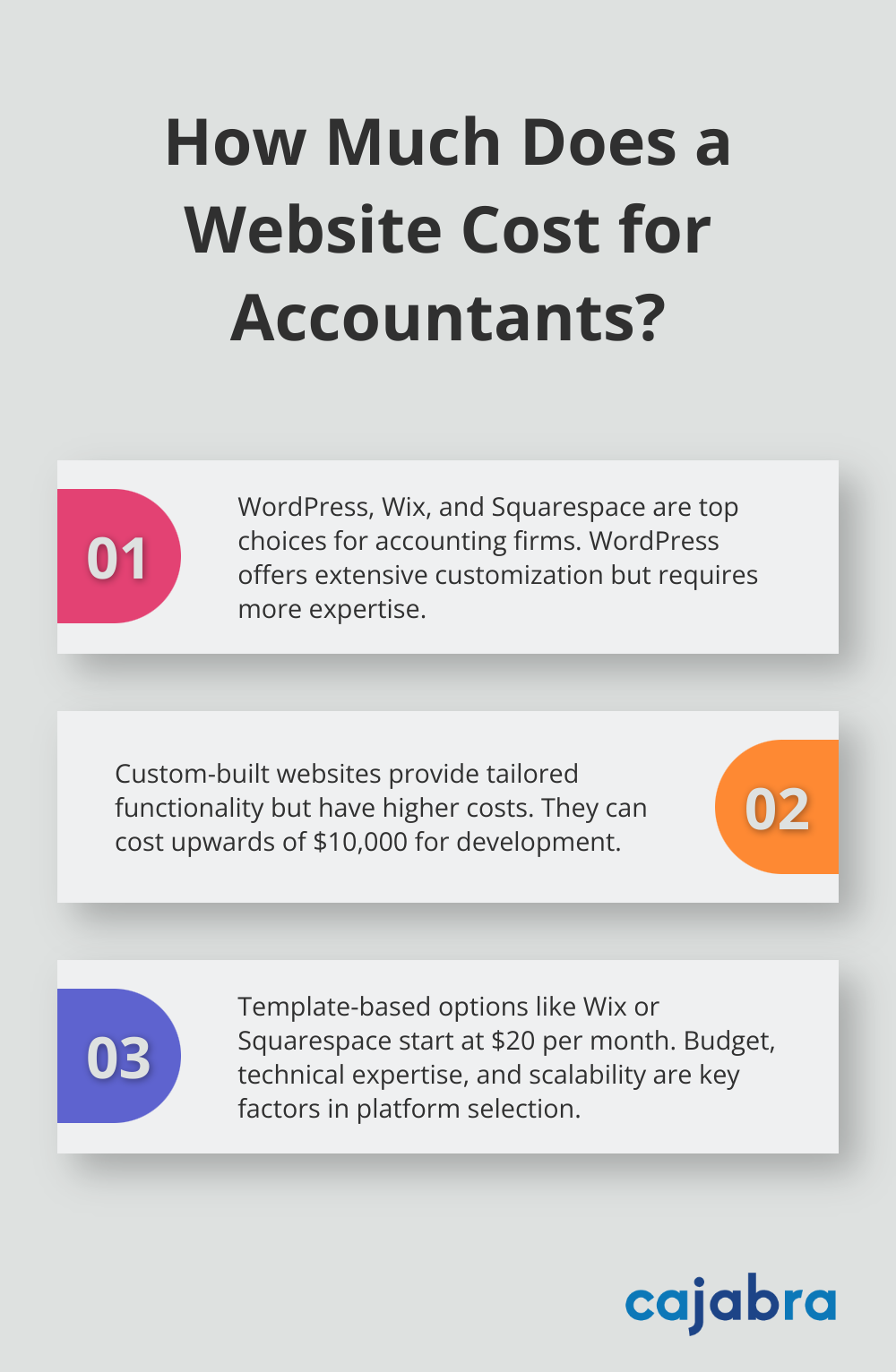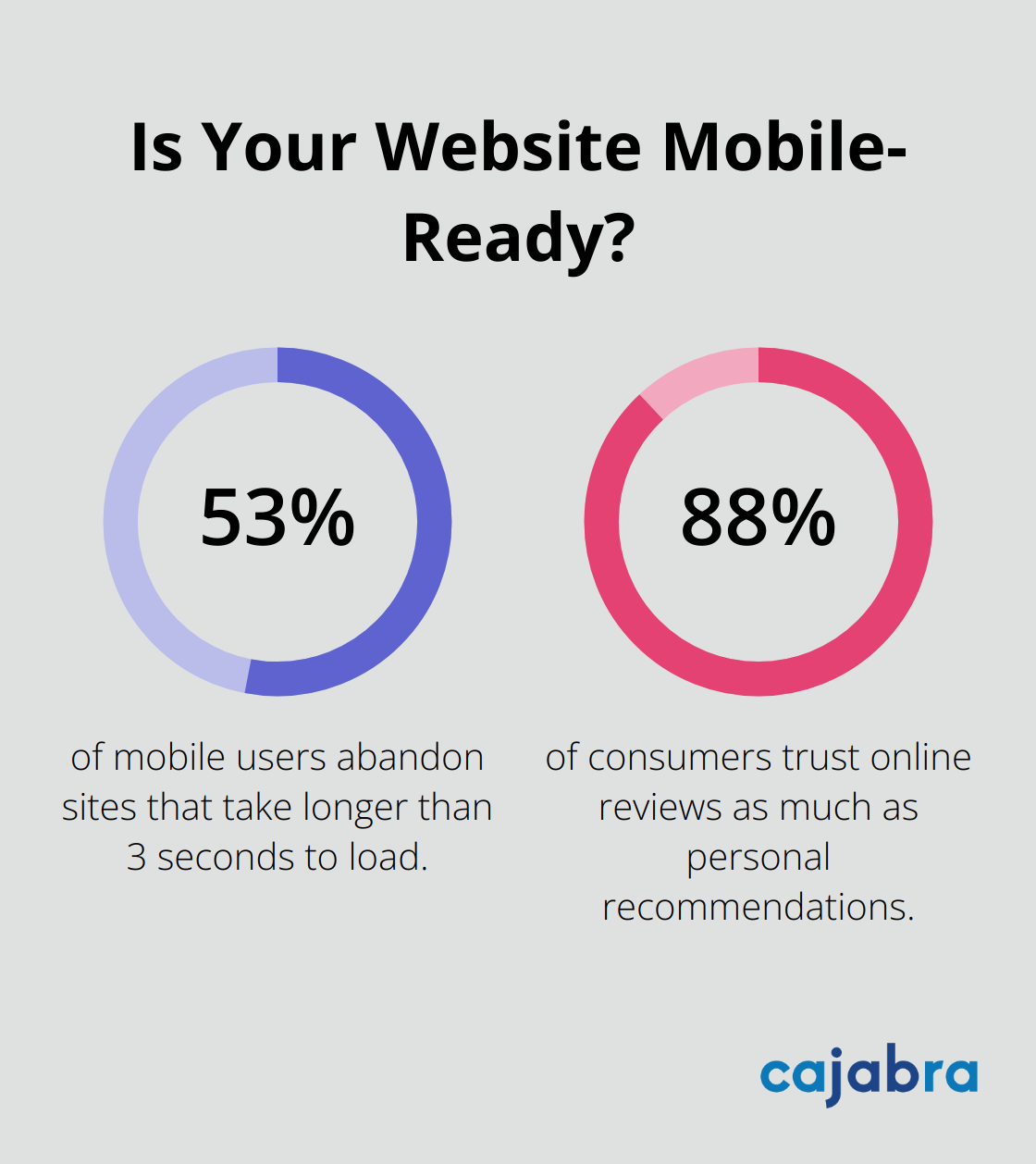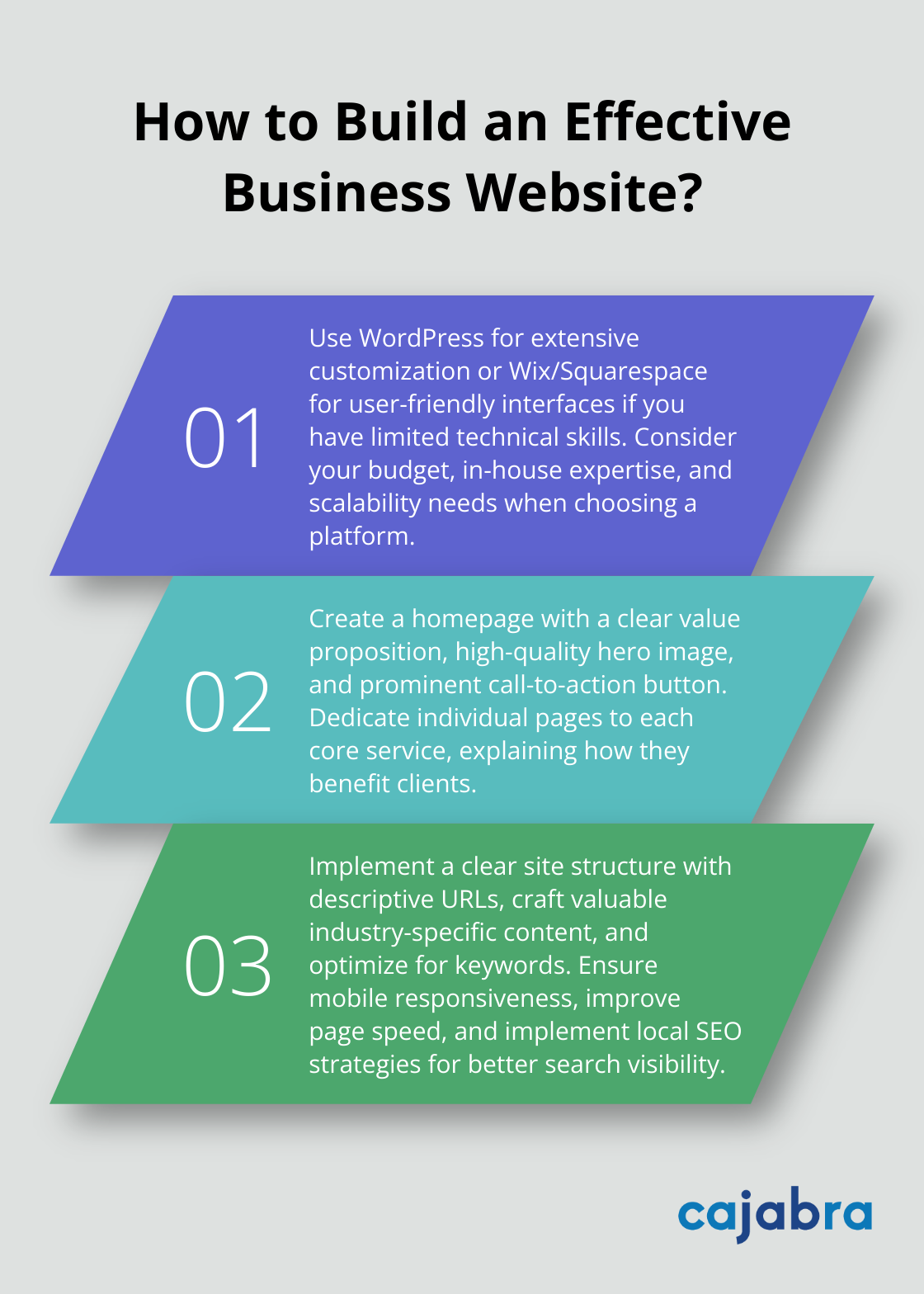
In today's digital age, a strong online presence is vital for accounting firms to attract and retain clients. At Cajabra, LLC, we understand the importance of websites for accounting firms in establishing credibility and showcasing expertise.
Building an effective website for your accounting practice doesn't have to be complicated or expensive. This guide will walk you through the essential steps to create a professional, user-friendly site that helps your firm stand out in a competitive market.
WordPress, Wix, and Squarespace stand out as top choices for accounting firms building their online presence. WordPress offers extensive customization options, perfect for firms planning to expand their digital footprint. It does require more technical expertise or a budget for professional development.

Wix and Squarespace provide user-friendly interfaces that enable even those with limited tech skills to create professional websites quickly. These platforms suit smaller firms or those new to online marketing.
Custom-built websites offer unparalleled uniqueness and functionality tailored to your firm's specific needs. They allow seamless integration with accounting software and client portals. However, they come with higher upfront costs and ongoing maintenance requirements.
Budget often tops the list of concerns for many firms. Custom solutions can cost upwards of $10,000, while template-based options like Wix or Squarespace start as low as $20 per month.
The technical skills of your team play a crucial role. If your firm lacks in-house web development expertise, user-friendly builders might be your best option.
Consider your firm's growth plans and ensure your chosen platform can accommodate future needs. A platform that grows with your business prevents the need for costly migrations down the line.
The best platform aligns with your firm's specific goals, resources, and technical capabilities. Conduct a thorough assessment of your needs before making this pivotal decision. Consider factors such as:
Your website serves as the digital face of your accounting firm. The platform you choose shapes how potential clients perceive and interact with your brand online. As you weigh your options, remember that the right choice sets the foundation for your firm's online success.
Now that you've selected your platform, let's explore the essential elements that make an accounting firm's website truly effective.
Your homepage serves as your digital first impression. It should convey professionalism and clarity immediately. Try a clean design with a clear value proposition. Replace generic greetings like "Welcome to Our Firm" with specific statements such as "Expert Tax Solutions for Small Businesses." This instantly communicates your target audience and services.

Include a high-quality hero image that represents your firm's personality (whether it's a team photo or a stylized graphic). Ensure it aligns with your brand. Add a prominent call-to-action (CTA) button like "Schedule a Consultation" to guide visitors towards engagement.
Dedicate individual pages to each of your core services. Don't just list them – explain how each service benefits your clients. For instance, if you offer bookkeeping, describe how it saves business owners time and provides insights for better decision-making.
Create a resources section with helpful articles, tax calculators, or downloadable guides. This positions your firm as a valuable source of information, not just a service provider. A study by the Content Marketing Institute found that 95% of B2B buyers view content as trustworthy when evaluating a company.
People do business with people, not faceless entities. Include a team page with professional photos and brief bios of key staff members. Highlight qualifications, but also include personal touches that make your team relatable. A survey by Edelman revealed that 64% of consumers need to trust a brand before they'll consider its messaging.
Client testimonials and case studies build trust powerfully. Feature these prominently throughout your site. Use specific examples of how you've helped clients overcome challenges or achieve goals. Numbers speak volumes – if you saved a client $10,000 in taxes, say so.
Your contact information should appear on every page, preferably in the header or footer. Include multiple contact methods – phone, email, and a contact form at minimum. Consider adding a live chat feature for immediate engagement. Almost ⅔ of buyers expect a response within 10 minutes to any marketing, sales, or customer service inquiry.
Place CTAs strategically throughout your site. These should be action-oriented and specific. Instead of "Contact Us," try "Get Your Free Tax Assessment." Make sure these buttons stand out visually from the rest of your page design.
An effective accounting firm website doesn't just exist online – it actively attracts and converts potential clients. The next section will explore how to optimize your site for search engines and user experience, ensuring your well-crafted website gets the visibility it deserves.
To further enhance your website's effectiveness, consider implementing practical tips and tools to boost engagement and grow your client base. Additionally, understanding your unique value proposition can help you stand out from competitors and attract your ideal clients.
A well-organized website improves both search engine rankings and user experience. Implement a clear, logical hierarchy in your site structure. Start with broad categories like Services, About Us, and Resources, then create subcategories as needed. For example, under Services, you might include Tax Preparation, Bookkeeping, and Business Advisory.

Use descriptive, keyword-rich URLs for each page. Instead of www.yourfirm.com/page1, opt for www.yourfirm.com/tax-preparation-services. This helps search engines understand your content and improves user navigation.
Make your main navigation menu intuitive and mobile-friendly. A study by the Nielsen Norman Group found that users are 89% more likely to stay on a site when it has clear navigation. Consider adding a search function to help visitors quickly find specific information.
Content reigns supreme in the digital world. Create in-depth, authoritative content that addresses your clients' pain points and questions. For example, write articles on topics like Tax Deductions for Small Businesses or How to Prepare for an IRS Audit.
Try a mix of evergreen content (always relevant) and timely updates (e.g., annual tax law changes). According to HubSpot, companies that blog regularly receive 55% more website visitors than those that don't.
Incorporate various content types to cater to different learning styles. This could include blog posts, infographics, videos, and downloadable guides. A diverse content strategy not only engages users but also gives search engines more material to index.
While creating content, focus on incorporating relevant keywords naturally. Use tools like Google Keyword Planner or SEMrush to identify terms your potential clients search for. For instance, long-tail keywords like "best accountant for small business in [your city]" can be highly effective.
Optimize your on-page elements:
Title tags: Include your primary keyword and keep it under 60 characters.
Meta descriptions: Write compelling summaries of your page content in 155-160 characters.
Header tags (H1, H2, H3): Use these to structure your content and include relevant keywords.
Image alt text: Describe your images using keywords where appropriate.
Focus on creating valuable content for your users first, then optimize for search engines.
With 63.38% of web traffic coming from mobile devices, a mobile-responsive design is essential. Google's mobile-first indexing means your site's mobile version is now the primary one for ranking purposes.
Page speed is equally important. According to Google, 53% of mobile users abandon sites that take longer than 3 seconds to load. Optimize your images, leverage browser caching, and consider using a content delivery network (CDN) to improve load times.
Use Google's PageSpeed Insights tool to identify specific areas for improvement on both mobile and desktop versions of your site.
For accounting firms serving specific geographic areas, local SEO is vital. Claim and optimize your Google My Business listing with accurate information, photos, and regular posts. Encourage satisfied clients to leave reviews – 88% of consumers trust online reviews as much as personal recommendations.
Ensure your NAP (Name, Address, Phone number) is consistent across all online directories and your website. Consider creating location-specific pages if you serve multiple areas.
Participate in local business events and create content around local financial news or regulations. This not only boosts your local SEO but also establishes your firm as an active community member.
Building a website for your accounting firm establishes a strong online presence and attracts new clients. Websites for accounting firms serve as powerful tools for growth and client acquisition, acting as 24/7 marketing hubs. These digital platforms showcase expertise, build trust, and provide valuable information to visitors, effectively representing your firm's professionalism and capabilities.

Regular maintenance and updates keep your site secure, relevant, and performing optimally. Staying current with industry trends, tax law changes, and technological advancements ensures your website remains a valuable resource. Your website is an investment in your firm's future, positioning you to attract, engage, and retain clients in an increasingly digital world.
At Cajabra, we understand the unique challenges accounting firms face in the digital landscape. Our specialized marketing services, including our JAB System™, help accountants transform their online presence and secure retainer-based clients. You can focus on serving your clients while we handle the intricacies of digital marketing and website optimization.



